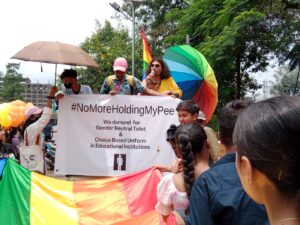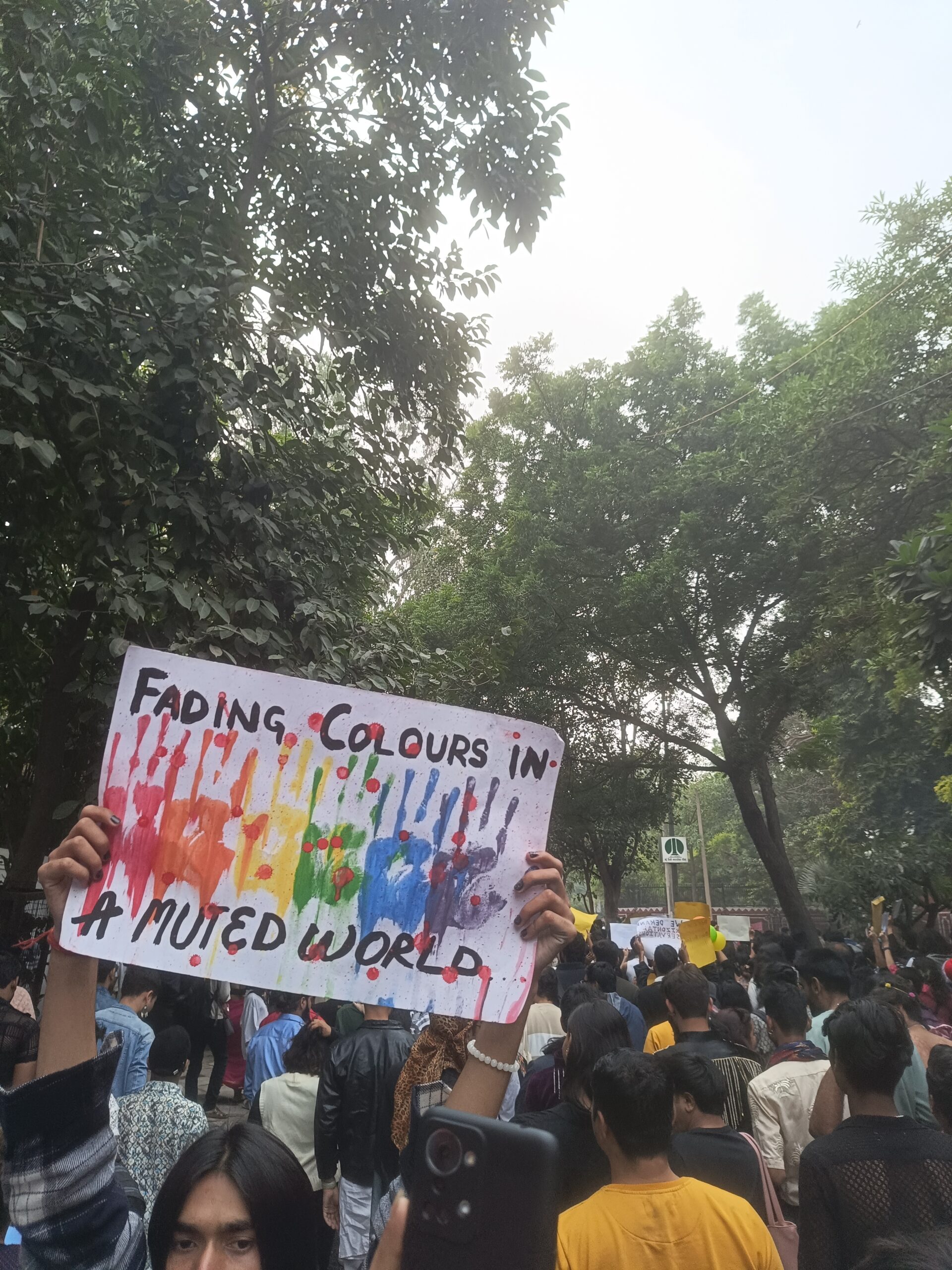
Rituparna, founder-director of Akam Foundation in Assam, launched a campaign, #NoMoreHoldingMyPee, in June 2022. Photo: Vikadan Rajasekar
Chennai: Trans woman and advocate Kanmani R works at the Madras High Court. But the 28-year-old often avoids going to the toilet as there is not a single gender-neutral restroom on the premises.
“The Madras High Court doesn’t have a gender-neutral toilet, only one for Persons with Disability. And people think only a person with a visible disability, for instance, someone who is wheelchair-bound, should access it,” says Kanmani.
On November 17, Kanmani wrote a letter to the Chief Justice of the Madras High Court, Justice Sanjay Vijaykumar Gangapurwala, pointing out the need to have gender-neutral toilets in addition to the existing ones at the Madras HC, stating it has taken a toll on her physical and mental health.
“The lack of gender-neutral toilets creates a barrier in accessing basic hygiene facilities for transgender persons like me as well as for persons who may not be open about their gender identity,” she stated in her letter. “This includes advocates, law students, staff, litigants as well as members of the general public.”
Right to sanitation is recognised as a fundamental human right by the UN. Sustainable Development Goal (6) also aims to achieve universal and equitable access to safe and affordable drinking water for all. It asks for access to adequate and equitable sanitation and hygiene for all people and an end to open defecation, paying particular attention to the needs of women and girls and those in vulnerable situations.
But in many parts of India, access to sanitation remains a challenge. The situation is worse for the transgender population, as they are denied admittance to toilets even in metros where cis people have easy access to them. Many trans people avoid drinking or eating for long periods of time as they are often forced to “hold” their stool and urine. That’s why activists across the country are pushing for single-stall gender-neutral toilets in public spaces, educational institutions and government as well as private organisations.
For members of the community, using gendered restrooms is dangerous and risky. Kanmani vividly remembers the day when she stepped into a women’s restroom at the Kashmere Gate metro station in Delhi. Her saree had come undone, and she needed the privacy of a washroom to drape it properly. But the moment Kanmani entered, the women inside rushed out, refusing to share the facility with a trans woman.
“I was forced to go to the men’s restroom as the toilet for persons with disabilities was locked,” says Kanmani, then 23 and a law student. What followed was an absolute nightmare. “Half the men inside left but the others, who were using the urinals, turned and exposed their genitals to me. I shouted, cried and tried using a stall so that I could quickly drape my saree and leave, but they didn’t allow me to do so.”
The next 30 minutes were harrowing for Kanmani, with people throwing slurs and cuss words at her. “Finally, one of the women sanitation workers, who had managed to get the key for the washroom for persons with disabilities, took me there. She was the only one who was kind to me,” says Kanmani.
Karan, a trans man based in Haryana, avoids even drinking water when he is outside. “I have been on hormone therapy for the last two years, so I have facial hair. I have had a mastectomy and hysterectomy. But the last surgery – phalloplasty – has not yet been done, so I cannot use the urinal in the men’s toilet. I need a stall with a door I can close,” says the 47-year-old yoga therapist, who is medically transitioning.
Highlighting the gravity of the situation, activists across the country have been campaigning for single-occupancy, gender-neutral toilets for years. In Assam, Rituparna, founder-director of Akam Foundation, launched a campaign, #NoMoreHoldingMyPee, in June 2022.
“A female-assigned non-binary person I know, who considers me his mother, has stopped going to college, as he had to hold his pee for long periods of time. He told me he had to wait for a friend to escort him to the toilet. This hit me hard, and I decided that I have to somehow bring about change,” says Rituparna. She organised an initiative this October in Dibrugarh, where people from all walks of life participated in a Pride Walk demanding gender-neutral restrooms in educational institutions across Assam.
Their petition on Change.org has more than 7,000 signatures so far. “Whenever I go to colleges for sensitisation programmes, I do speak about the need for gender-neutral toilets,” she says, adding that they are planning to meet the minister for education, and the secretary for social justice and empowerment to seek immediate action in this regard.
Down in Chennai, Fred Rogers, a man of trans experience, filed a petition at the Madras High Court in April 2022, asking for “single occupancy, gender neutral toilets. His petition says all gender toilets in addition to the existing gendered restrooms in educational institutions, malls, bus stations, railway stations, airports and other public places in Tamil Nadu, should be accessible to transgender people, queer people, non-binary people, gender non-conforming people and others in addition to cisgender people.”
The lack of such toilet facilities had led to the isolation of the queer and trans communities from mainstream society, and building them would make the community members feel more exclusive, the petitioner said. The case came up for hearing earlier this year.
“Many people are coming out as non-binary, and struggle to use gendered restrooms,” says Fred, who is trans rights activist working for trans masculine inclusion in all walks of life. “It’s a person’s choice whether to go through a medical transitioning journey or not. But irrespective of that, their identity must be respected. In India, people are glued in binaries, and don’t understand that a person assigned female at birth, irrespective of the medical transitioning process, can identify as someone in the trans masculine spectrum. This also applies to intersex people, who may not be comfortable using gendered restrooms.”
The situation may not be as scary for people who “pass” (look like) as a cis man or woman, adds Fred. “I don’t face any issues now as I pass as a cis man, and can use a male restroom but not many have this privilege of passing. I did face a lot of problems when I was transitioning. Once, at an airport in Goa, when I was about to enter a women’s toilet, an old man chased me with a stick, shouting that I was going to rape a woman. That’s why we need accessible toilets for gender non-conforming people. It’s a basic necessity in all public spaces.”
Thankfully, the winds of change have been blowing. Some hotels, educational institutions and corporates now offer gender-neutral toilets. Earlier this year, the Supreme Court of India announced that nine gender-neutral bathrooms are being set up on the court premises. Institutions such as IIT Delhi and the National Academy of Legal Studies and Research (NALSAR), Telangana, have introduced gender-neutral washrooms on their campuses.
“In 2022, after a student from the rainbow community put up a post on social media about the need for a gender-neutral toilet, we created one in our building. We will also have one in the new building that is coming up,” says Dr Sunita Agarwalla, vice principal, Dispur College, Guwahati, Assam.
Rituparna says Tezpur Central University recently built a gender-neutral washroom in the building of the Department of Social Work. “When I went there last January, the faculty members were confused over which toilet I could access. Later, they took me to the women’s toilet meant for faculty members,” she says. “When they realised they didn’t have a space for non-binary people, they met the vice chancellor, explained the issue and created one,” says Rituparna, adding that they consulted with her and other activists several times about the design elements.
In her letter, Kanmani has requested that the Court breathe life into the judgement of NALSA v Union of India judgement (AIR 2014 SC 1863) and give effect to Rule 12(4)(a) of the Transgender Persons (Protection of Rights) Rules, 2020 that requires every establishment to provide details of infrastructural facilities like unisex toilets or gender-neutral washrooms.
She has also requested the Chief Justice to direct the creation of an additional gender-neutral toilet on every floor of the Madras High Court campus where there are ‘Male’ and ‘Female’ washrooms, and toilets for persons with disabilities. Kanmani also said that such a facility is vital to carrying out her duties efficiently. “Gender-neutral toilets are essential for transgender persons like myself to pursue litigation, and assist my clients and the bar in the best manner possible.”

‘’ You are holding your pee, and mocked by people when you try to access restrooms, which can be very demeaning and frustrating’’
Dr Vibha Usha Radhakrishnan
The lack of gender-neutral toilets poses another challenge too – holding your urine and stool for a long time can have a serious impact on your health. “It can lead to serious urinary tract infections, incontinence, renal stones and constipation-related issues like anal fissures, haemorrhoids, as well as gastric issues,” says transwoman Dr Vibha Usha Radhakrishnan who currently practises at a private clinic in Palakkad, Kerala. She adds that “holding” also affects you psychologically. “Often you are holding your pee, and mocked by people when you try to access restrooms, which can be very demeaning and frustrating,” she says.
Dr Sanjay Kalra, President of Indian Professional Association for Transgender Health (IPATH), says the bio-psycho-social model is a good way of understanding the determinants or causes of health and ill health.
“If somebody drinks or eats less, the chances of dehydration (lack of fluid in the body), low sodium and low glucose go up. So the body begins to slow down, physically and mentally. This means that a person who is engaged in a difficult or strenuous job, whether it is a rickshaw puller or a manual worker, or maybe a person whose job influences the lives of many people, such as a school bus driver, may end up making mistakes. This puts many lives at risk,” says Dr Kalra, endocrinologist and consultant, Bharti Hospital.
“This situation worsens in summer. If people don’t eat or drink adequately, the risk of heat exhaustion goes up. It can also lead to heat stroke, and, in some cases, death,” says Dr Kalra, who is based in Karnal, Haryana.
And, there is more. “If you keep holding urine for long periods of time, it remains in the urinary bladder, which may get infected and cause cystitis. This urinary tract infection takes a long time to heal, and may predispose some people to kidney stones,” says Dr Kalra. Delaying urination also puts pressure on the bladder, and it may lose its ability to respond to the pressure of urine, Dr Kalra says.
“Similarly, holding stool for long periods of time may put extra pressure on the muscles of the anus or rectum. In the long run, this can precipitate other urinary and gut motility disorders,” he says.
It also impacts a person’s psychological and social health. Avoiding food and water for long periods of time can impair your quality of life and reduce overall happiness. It also forces people to avoid social interactions. “For example, if I am a TG individual, I may hold my urine or stool for eight hours at work, but if I am invited to an afterwork party where I have to do this for another three hours, I may avoid going for it,” says Dr Kalra. “Or if my entire family is travelling on vacation that involves maybe six hours of journey by road and I don’t feel comfortable using public washrooms, I will not join that trip.”
Trans people who have been forced to “hold” reveal that it has impacted their health. Karan says he often suffers from UTIs, abdominal pain and constipation.
Kanmani says she has chronic gastric issues and bad breath. Her letter states: “The lack of gender-neutral toilets on the premises of the Madras High Court has made me hold my bowels several times, and avoid eating food or drinking water. This has also severely affected my physical and mental health. I have also been dehydrated many times owing to this, and suffered from urinary tract infections.”
Fred Rogers says the right to sanitation is a basic human right. “So why is it not accessible to the gender non-conforming population?” he asks.
FACT FILE
- Transgender person: A transgender person is someone whose gender identity does not match with the sex they were assigned at birth. People assigned male or female at birth, and intersex persons, can be transgender.
- Trans man/ transgender man: Transgender man refers to a person who was assigned female at birth, but whose gender identity is that of a man. ‘Transgender man’ can be shortened to ‘trans man’.
- Trans woman/ transgender woman: Transgender woman refers to a person who was assigned male at birth, but whose gender identity is that of a woman. ‘Transgender woman’ can be shortened to ‘trans woman’.
- Gender dysphoria: The psychological distress that results from an incompatibility between a person’s self-perceived gender identity, and the gender they are associated with by society based on the sex they were assigned at birth. Not all trans persons may experience gender dysphoria. Many may experience gender dysphoria from childhood, while others may experience it later – such as after puberty.
- Intersex: Intersex people have innate sex characteristics that do not fit medical and social norms for female or male bodies. These can include external or internal reproductive parts, chromosome patterns, and/ or hormonal patterns. Being intersex can create risks or experiences of stigma, discrimination and harm.
- Cisgender: A person whose gender identity conforms with the gender corresponding to the sex assigned at birth. A person who is not transgender or non-binary is cisgender.
Source: ‘Glossary of LGBTQIA+ Terms’ By The News Minute & Queer Chennai Chronicles
- Transmasculine: Individuals assigned female at birth based on their external genitalia who identify with or experience a significant alignment with masculinity.
- Transfeminine: People who were assigned male at birth but identify more with a feminine identity.



